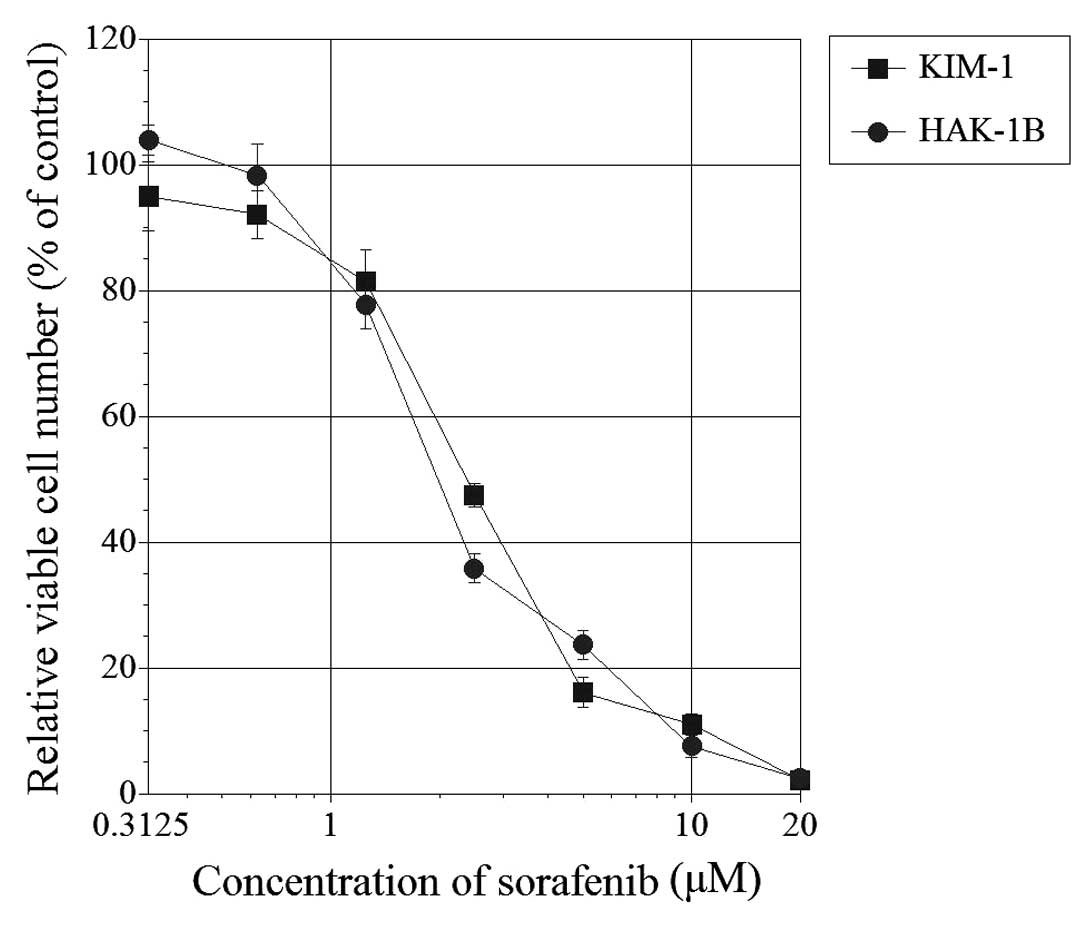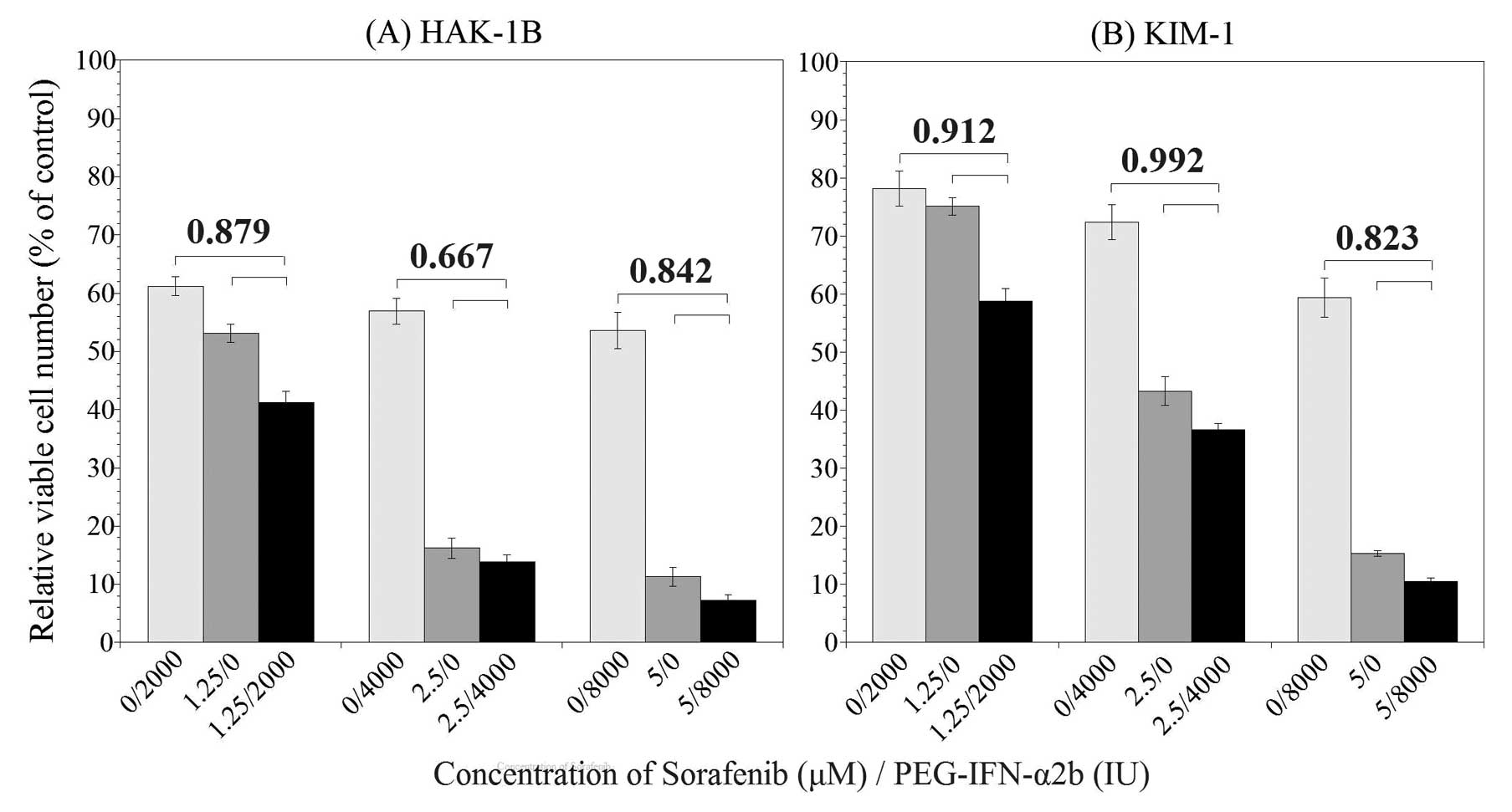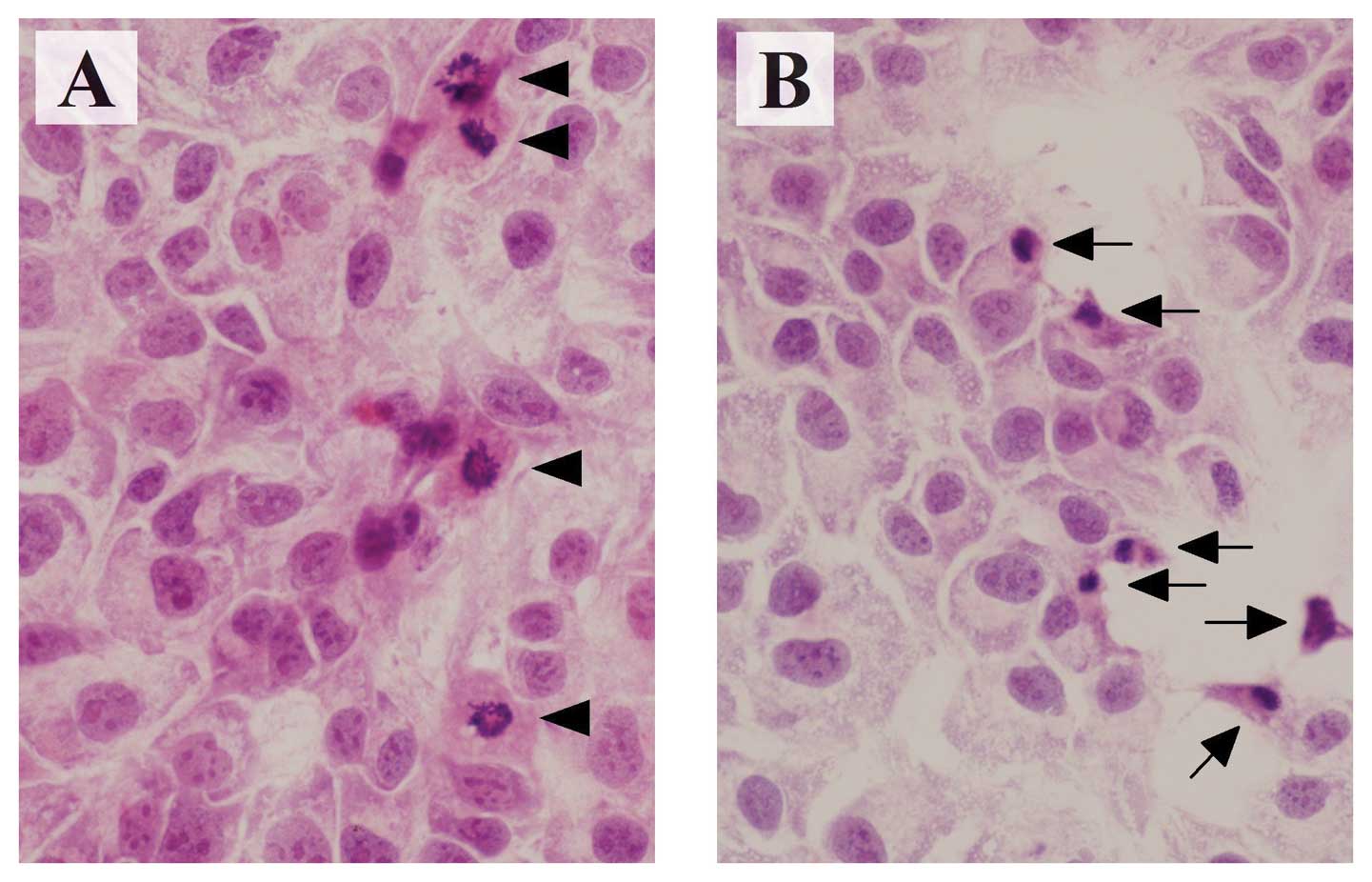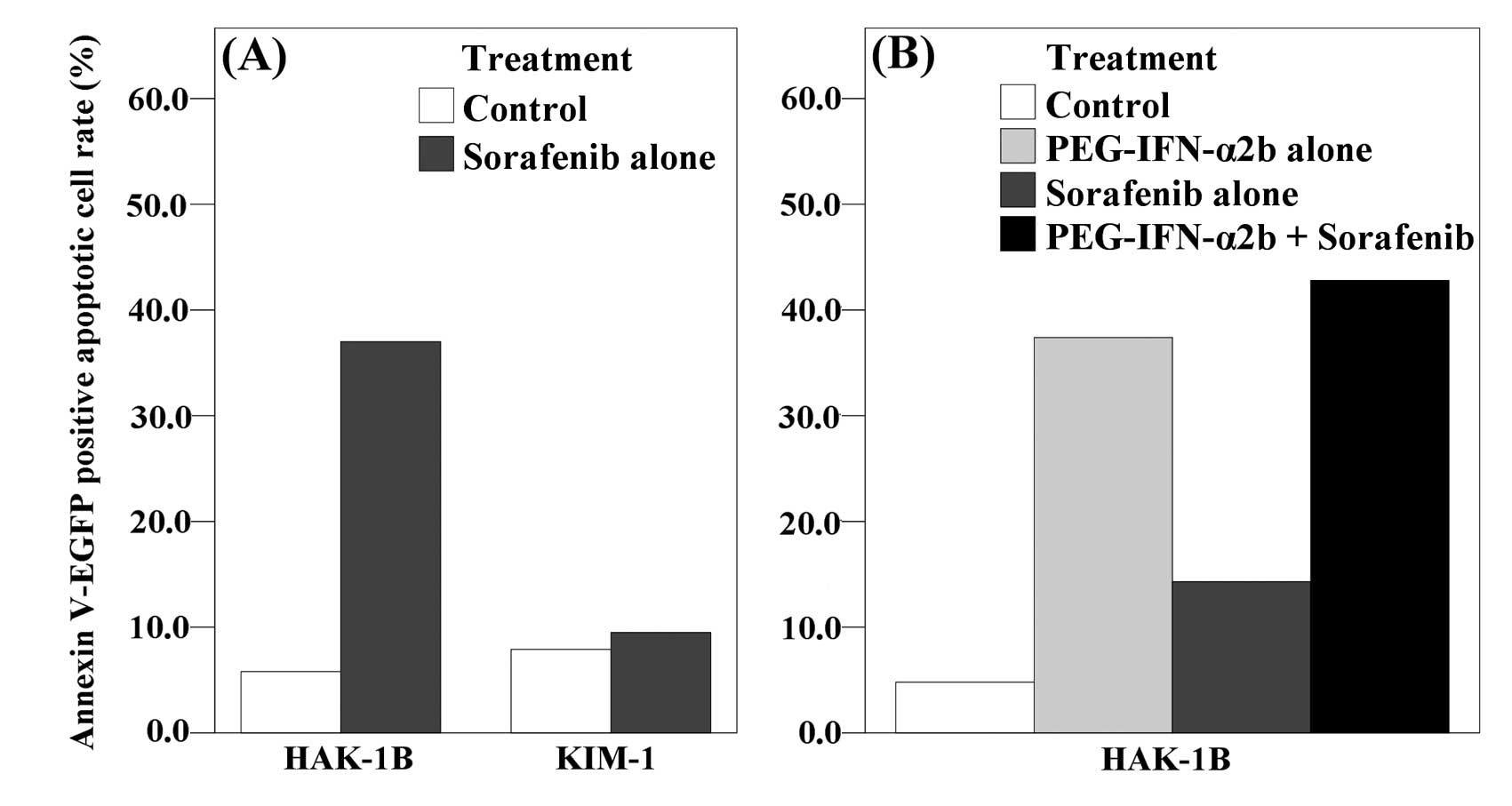|
1
|
Ferlay J, Shin H-R, Bray F, Forman D,
Mathers C and Parkin DM: Estimates of worldwide burden of cancer in
2008: GLOBOCAN 2008. Int J Cancer. 127:2893–2917. 2008. View Article : Google Scholar : PubMed/NCBI
|
|
2
|
Llovet JM, Burroughs A and Bruix J:
Hepatocellular carcinoma. Lancet. 362:1907–1917. 2003. View Article : Google Scholar
|
|
3
|
Bruix J and Sherman M: Management of
hepatocellular carcinoma. Hepatology. 42:1208–1236. 2005.
View Article : Google Scholar
|
|
4
|
Llovet JM, Bustamante J, Castells A,
Vilana R, Ayuso Mdel C, Sala M, Brú C, Rodés J and Bruix J: Natural
history of untreated nonsurgical hepatocellular carcinoma:
rationale for the design and evaluation of therapeutic trials.
Hepatology. 29:62–67. 1999. View Article : Google Scholar : PubMed/NCBI
|
|
5
|
Wilhelm SM, Adnane L, Newell P, Villanueva
A, Llovet JM and Lynch M: Preclinical overview of sorafenib, a
multikinase inhibitor that targets both Raf and VEGF and PDGF
receptor tyrosine kinase signaling. Mol Cancer Ther. 7:3129–3140.
2008. View Article : Google Scholar : PubMed/NCBI
|
|
6
|
Llovet JM, Ricci S, Mazzaferro V, Hilgard
P, Gane E, Blanc JF, de Oliveira AC, Santoro A, Raoul JL, Forner A,
Schwartz M, Porta C, Zeuzem S, Bolondi L, Greten TF, Galle PR,
Seitz JF, Borbath I, Häussinger D, Giannaris T, Shan M, Moscovici
M, Voliotis D and Bruix J; SHARP Investigators Study Group:
Sorafenib in advanced hepatocellular carcinoma. N Engl J Med.
359:378–390. 2008. View Article : Google Scholar : PubMed/NCBI
|
|
7
|
Cheng AL, Kang YK, Chen Z, Tsao CJ, Qin S,
Kim JS, Luo R, Feng J, Ye S, Yang TS, Xu J, Sun Y, Liang H, Liu J,
Wang J, Tak WY, Pan H, Burock K, Zou J, Voliotis D and Guan Z:
Efficacy and safety of sorafenib in patients in the Asia-Pacific
region with advanced hepatocellular carcinoma: a phase III
randomised, double-blind, placebo-controlled trial. Lancet Oncol.
10:25–34. 2009. View Article : Google Scholar
|
|
8
|
Gollob JA, Rathmell WK, Richmond TM,
Marino CB, Miller EK, Grigson G, Watkins C, Gu L, Peterson BL and
Wright JJ: Phase II trial of sorafenib plus interferon alfa-2b as
first- or second-line therapy in patients with metastatic renal
cell cancer. J Clin Oncol. 25:3288–3295. 2007. View Article : Google Scholar
|
|
9
|
Escudier B, Szczylik C, Hutson TE, Demkow
T, Staehler M, Rolland F, Negrier S, Laferriere N, Scheuring UJ,
Cella D, Shah S and Bukowski RM: Randomized phase II trial of
first-line treatment with sorafenib versus interferon alfa-2a in
patients with metastatic renal cell carcinoma. J Clin Oncol.
27:1280–1289. 2009. View Article : Google Scholar : PubMed/NCBI
|
|
10
|
Sakon M, Nagano H, Dono K, Nakamori S,
Umeshita K, Yamada A, Kawata S, Imai Y, Iijima S and Monden M:
Combined intraarterial 5-fluorouracil and subcutaneous interferon-α
therapy for advanced hepatocellular carcinoma with tumor thrombi in
the major portal branches. Cancer. 94:435–442. 2002.
|
|
11
|
Pestka S, Langer JA, Zoon KC and Samuel
CE: Interferons and their actions. Annu Rev Biochem. 56:727–777.
1987. View Article : Google Scholar
|
|
12
|
Yano H, Iemura A, Haramaki M, Ogasawara S,
Takayama A, Akiba J and Kojiro M: Interferon alfa receptor
expression and growth inhibition by interferon alfa in human liver
cancer cell lines. Hepatology. 29:1708–1717. 1999. View Article : Google Scholar : PubMed/NCBI
|
|
13
|
Hisaka T, Yano H, Ogasawara S, Momosaki S,
Nishida N, Takemoto Y, Kojiro S, Katafuchi Y and Kojiro M:
Interferon-αCon1 suppresses proliferation of liver cancer cell
lines in vitro and in vivo. J Hepatol. 41:782–789. 2004.
|
|
14
|
Yano H, Ogasawara S, Momosaki S, Akiba J,
Kojiro S, Fukahori S, Ishizaki H, Kuratomi K, Basaki Y, Oie S,
Kuwano M and Kojiro M: Growth inhibitory effects of pegylated IFN
alpha-2b on human liver cancer cells in vitro and in vivo. Liver
Int. 26:964–975. 2006. View Article : Google Scholar : PubMed/NCBI
|
|
15
|
Ikeda K, Saitoh S, Arase Y, Chayama K,
Suzuki Y, Kobayashi M, Tsubota A, Nakamura I, Murashima N, Kumada H
and Kawanishi M: Effect of interferon therapy on hepatocellular
carcinogenesis in patients with chronic hepatitis type C: a
long-term observation study of 1643 patients using statistical bias
correction with proportional hazard analysis. Hepatology.
29:1124–1130. 1999. View Article : Google Scholar
|
|
16
|
Ikeda K, Arase Y, Saitoh S, Kobayashi M,
Suzuki Y, Suzuki F, Tsubota A, Chayama K, Murashima N and Kumada H:
Interferon beta prevents recurrence of hepatocellular carcinoma
after complete resection or ablation of the primary tumor-A
prospective randomized study of hepatitis C virus-related liver
cancer. Hepatology. 32:228–232. 2000. View Article : Google Scholar
|
|
17
|
Mazzella G, Accogli E, Sottili S, Festi D,
Orsini M, Salzetta A, Novelli V, Cipolla A, Fabbri C, Pezzoli A and
Roda E: Alpha interferon treatment may prevent hepatocellular
carcinoma in HCV-related liver cirrhosis. J Hepatol. 24:141–147.
1996. View Article : Google Scholar : PubMed/NCBI
|
|
18
|
Nishiguchi S, Kuroki T, Nakatani S,
Morimoto H, Takeda T, Nakajima S, Shiomi S, Seki S, Kobayashi K and
Otani S: Randomised trial of effects of interferon-α on incidence
of hepatocellular carcinoma in chronic active hepatitis C with
cirrhosis. Lancet. 346:1051–1055. 1995.
|
|
19
|
Nishiguchi S, Tamori A and Kubo S: Effect
of long-term postoperative interferon therapy on intrahepatic
recurrence and survival rate after resection of hepatitis C
virus-related hepatocellular carcinoma. Intervirology. 48:71–75.
2005. View Article : Google Scholar
|
|
20
|
Sakaguchi Y, Kudo M, Fukunaga T, Minami Y,
Chung H and Kawasaki T: Low-dose, long-term, intermittent
interferon-alpha-2b therapy after radical treatment by
radiofrequency ablation delays clinical recurrence in patients with
hepatitis C virus-related hepatocellular carcinoma. Intervirology.
48:64–70. 2005. View Article : Google Scholar
|
|
21
|
Murakami T: Establishment and
characterization of human hepatoma cell line (KIM-1). Acta Hepatol
Jpn. 25:532–539. 1984. View Article : Google Scholar
|
|
22
|
Yano H, Iemura A, Fukuda K, Mizoguchi A,
Haramaki M and Kojiro M: Establishment of two distinct human
hepatocellular carcinoma cell lines from a single nodule showing
clonal dedifferentiation of cancer cells. Hepatology. 18:320–327.
1993. View Article : Google Scholar : PubMed/NCBI
|
|
23
|
Chou TC and Talalay P: Quantitative
analysis of dose-effect relationships: the combined effects of
multiple drugs or enzyme inhibitors. Adv Enzyme Regul. 22:27–55.
1984. View Article : Google Scholar : PubMed/NCBI
|
|
24
|
Tanigawa N, Lu C, Mitsui T and Miura S:
Quantification of sinusoid-like vessels in hepatocellular
carcinoma: its clinical and prognostic significance. Hepatology.
26:1216–1223. 1997.PubMed/NCBI
|
|
25
|
Wang L, Jia D, Duan F, Sun Z, Liu X, Zhou
L, Sun L, Ren S, Ruan Y and Gu J: Combined anti-tumor effects of
IFN-α and sorafenib on hepatocellular carcinoma in vitro and in
vivo. Biochem Biophys Res Commun. 422:687–692. 2012.
|
|
26
|
Tedjarati S, Baker CH, Apte S, Huang S,
Wolf JK, Killion JJ and Fidler IJ: Synergistic therapy of human
ovarian carcinoma implanted orthotopically in nude mice by optimal
biological dose of pegylated interferon alpha combined with
paclitaxel. Clin Cancer Res. 8:2413–2422. 2002.
|
|
27
|
Huang SF, Kim SJ, Lee AT, Karashima T,
Bucana C, Kedar D, Sweeney P, Mian B, Fan D, Shepherd D, Fidler IJ,
Dinney CP and Killion JJ: Inhibition of growth and metastasis of
orthotopic human prostate cancer in athymic mice by combination
therapy with pegylated interferon-alpha-2b and docetaxel. Cancer
Res. 62:5720–5726. 2002.PubMed/NCBI
|
|
28
|
Hlatky L, Hahnfeldt P and Folkman J:
Clinical application of antiangiogenic therapy: microvessel
density, what it does and doesn’t tell us. J Natl Cancer Inst.
94:883–893. 2002.PubMed/NCBI
|
|
29
|
Yao J, Wu X, Zhuang G, Kasman IM, Vogt T,
Phan V, Shibuya M, Ferrara N and Bais C: Expression of a functional
VEGFR-1 in tumor cells is a major determinant of anti-PlGF
antibodies efficacy. Proc Natl Acad Sci USA. 108:11590–11595. 2011.
View Article : Google Scholar : PubMed/NCBI
|



















